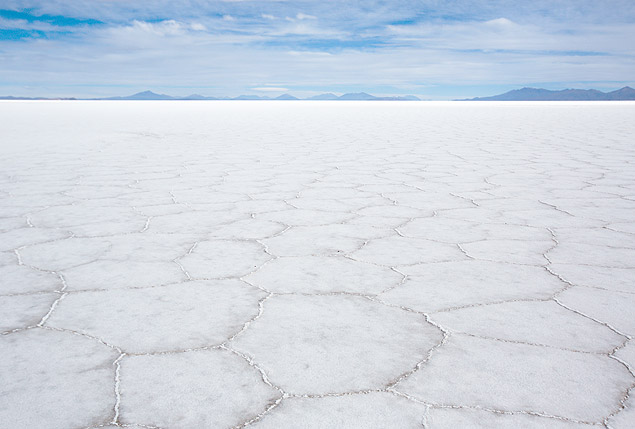Latest Photo Galleries
Brazilian Markets
17h36 Bovespa |
-0,07% | 124.646 |
16h43 Gold |
0,00% | 117 |
17h00 Dollar |
+0,29% | 5,1640 |
16h30 Euro |
+0,49% | 2,65250 |
ADVERTISING
Bolivia Wants to Use Lithium Reserves to Produce High-Technology Batteries
08/03/2015 - 09h46
Advertising
FABIANO MAISONNAVE
SPECIAL ENVOY TO SALAR DE UYUNI AND LA PAZ (BOLIVIA)
Rio Grande is comprised of only a few houses with apparent bricks and dirt streets beside Salar de Uyuni, the biggest salt flat in the world.
This is where Bolivia intends to create the basis of a state-of-the-art lithium industry, a material of growing demand as it is the raw material for the batteries that power most gadgets and new electric cars.
The biggest lithium reserve is located under the white layer of salt in Uyuni.
It is still nearly untouched: although the reserve has attracted the interest of several companies from around the world, the president of Bolivia, Evo Morales, decided to develop the entire production chain with the country's own technology.
Delays in the project have not prevented the Bolivian government from promising to fight for the market which is currently dominated by giant corporations such as Panasonic, Samsung, LG and Tesla.
The project started in 2008 and has two ends. The pilot factory of lithium carbonate visited by Folha is located in Rio Grande. Under the army's custody, huge canvas pools expose the brine that contains the lithium which is extracted in evaporation.
To capitalize on the production, President Morales inaugurated an experimental battery factory with Chinese equipment last year. The Bolivian government says it produces batteries for mobile phones and electric bicycles at the site.
At first, the production is intended to meet the internal market's demand, to sell batteries capable of storing solar energy and to be used on helmets for miners.
Analysts say there are many doubts regarding the project, especially those involving Bolivia's capacity to develop the necessary technology.
One of the main tourist attractions in South America, the Salar de Uyuni has suffered little impact from the lithium mining. The extraction pools occupy only 0.06% of the flat, an area formed tens of thousands of years ago when a lake dried out.
The government says that when the project is finished, it will occupy a total of 0.2% of the area.
Translated by THOMAS MUELLO
Read the article in the original language
| Bruno Scatena/Folhapress | ||
 |
||
| Salar de Uyuni is the world's largest salt flat |



